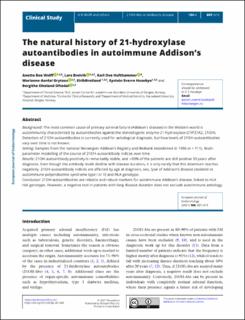The natural history of 21-hydroxylase autoantibodies in autoimmune Addison’s disease
Wolff, Anette Susanne Bøe; Breivik, Lars Ertesvåg; Hufthammer, Karl Ove; Grytaas, Marianne; Bratland, Eirik; Husebye, Eystein Sverre; Oftedal, Bergithe Eikeland
Journal article, Peer reviewed
Published version

Åpne
Permanent lenke
https://hdl.handle.net/11250/2831865Utgivelsesdato
2021Metadata
Vis full innførselSamlinger
- Department of Clinical Science [2293]
- Registrations from Cristin [9487]
Originalversjon
European Journal of Endocrinology (EJE). 2021, 184 (4), 607-615. 10.1530/EJE-20-1268Sammendrag
Background: The most common cause of primary adrenal failure (Addison’s disease) in the Western world is autoimmunity characterized by autoantibodies against the steroidogenic enzyme 21-hydroxylase (CYP21A2, 21OH). Detection of 21OH-autoantibodies is currently used for aetiological diagnosis, but how levels of 21OH-autoantibodies vary over time is not known.
Setting: Samples from the national Norwegian Addison’s Registry and Biobank established in 1996 (n = 711). Multi-parameter modelling of the course of 21OH-autoantibody indices over time.
Results: 21OH-autoantibody positivity is remarkably stable, and >90% of the patients are still positive 30 years after diagnosis. Even though the antibody levels decline with disease duration, it is only rarely that this downturn reaches negativity. 21OH-autoantibody indices are affected by age at diagnosis, sex, type of Addison’s disease (isolated vs autoimmune polyendocrine syndrome type I or II) and HLA genotype.
Conclusion: 21OH-autoantibodies are reliable and robust markers for autoimmune Addison’s disease, linked to HLA risk genotype. However, a negative test in patients with long disease duration does not exclude autoimmune aetiology.
